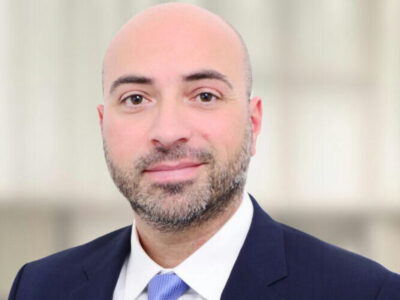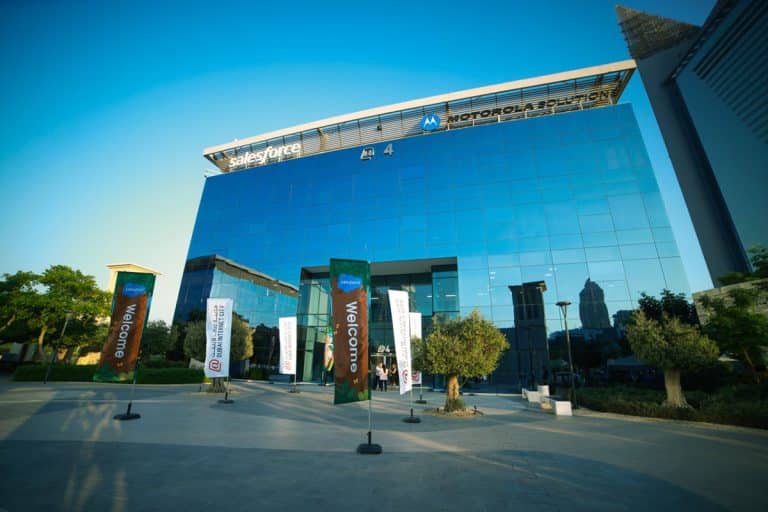The UAE is a very “dynamic region driven by visionary leaders,” Salesforce’s President and Chief Engineering Officer Srini Tallapragada told Arabian Business in an exclusive interview.
“Every CIO and CEO I meet [in Dubai], want to take a leap forward. They are very forward-thinking, very dynamic. And I think this place will show the world how things are done,” he said.
Tallapragada’s comments came on the sidelines of the opening of Salesforce’s new office located in Dubai Internet City.
Salesforce opens brand new Dubai Internet City office
Salesforce’s newly inaugurated office is part of the company’s commitment to support AI innovation, customer success and growth in the UAE.
“The UAE market is active in tourism, real estate, distribution, and retail. We offer solutions that can help in this environment. We’ve expanded beyond CRM to focus on industry-specific solutions, offering pre-built features for 15 industries to accelerate implementation. Our new UAE office in Dubai Internet City reflects our global design, creating a consistent experience for employees and customers. It’s a space for brainstorming, partnering, and training,” Thierry Nicault, AVP and GM told Arabian Business.
Salesforce’s new office also furthers its investment in the UAE. In the previous year, Salesforce introduced Hyperforce, its cloud platform, in the UAE in collaboration with Amazon Web Services.
This year, the company received the Dubai Electronic Security Centre Cloud Service Provider Security Standard for its Hyperforce services in the UAE to support government and public sector entities.
Salesforce is growing in the UAE as companies invest in digital transformation and seek Salesforce as an AI partner. The new office, with its spaces for collaboration, will allow Salesforce to display its AI technology and serve local customers.
At Dreamforce, Salesforce introduced Agentforce, a set of AI agents that assist employees and customers and handle tasks according to their role in service, sales, marketing, and commerce, aiming to improve efficiency and customer satisfaction.
These agents are integrated into Salesforce apps and use data from Salesforce’s Data Cloud to provide responses. They can perform business processes on their own, reducing workload and increasing productivity.
When asked how Salesforce’s latest solutions like Agentforce and Data Cloud helping organisations are leverage AI for digital transformation, Tallapragada said: “co-pilots haven’t succeeded because they lack understanding of an agent’s requirements. An agent needs a job description, data access, the ability to take action, and a workspace. Many companies have isolated data, which hinders effectiveness. Salesforce provides job descriptions, metadata of customer data, and easy access to trapped data through Data Cloud. We also offer action capabilities through MuleSoft. AgentForce packages these elements to reduce complexity for customers.”
Tallapragada added that while the first wave of AI was predictive, using machine learning techniques, Salesforce has operated to be a leader in enterprise AI.
“Our platform generates trillions of AI predictions weekly. Generative AI emerged about two years ago, and companies began building co-pilots. However, co-pilots have limitations and often fail to deliver value. The third wave is agents, which have job descriptions, understand context, and can follow rules. Humans and AI can work together for customer success. Our customers want to build, run, and scale these agents reliably. The fourth wave, involving robotics, is still in development,” he said.
But, what about significant challenges organisations face when deploying AI?
There are significant challenges organisations face when deploying AI, according to Tallapragada. “[These are] technical and organisational challenges. These systems are probabilistic, not deterministic, and can create inaccuracies and biases. We’ve invested in a trust layer to mitigate these issues. Organisations need to reduce data silos and define agent roles clearly. Leadership must drive this change. In the UAE, leaders are forward-thinking and eager to adopt new technologies,” he said, adding that the current AI revolution feels similar to the internet revolution.
People view it as transformative across industries, but there is hype at present, Tallapragada explained, adding that they often misjudge its short-term and long-term effects.
According to the Salesforce boss, customers express frustration with co-pilot projects that are expensive and ineffective, and they look for solutions suitable for enterprises.
At the infrastructure level, models change often, he said, adding that Salesforce’s task is to simplify this complexity. Customers request guidance on connecting with their clients in new ways – a service that is personalised and proactive on a large scale.
Looking forward, the company envisions customers creating many agents on their platform, with these agents interacting within and between companies – further driving digital transformation in the UAE, as businesses in the region adopt AI and cloud solutions.
“We prioritise trust, customer success, innovation, equality, and sustainability. We’ve built a trust layer to filter out sensitive information and reduce biases. We’re developing smaller language models for efficiency and creating benchmarks for ethics and accuracy. We’re addressing cybersecurity challenges, working with partners and adhering to ethical guidelines,” he concluded.
Brand View allows our business partners to share content with Arabian Business readers.
The content is supplied by Arabian Business Brand View Partners.








